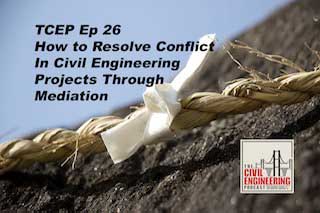Podcast – Mediation in Civil Engineering and Construction: What is the role of engineers?
Recently, I was interviewed by Chris Knutson, P.E., regarding the role of engineers in mediation of civil engineering and construction projects. It was a lively interview considering that he is in Stuttgart, Germany while I’m in California.
Here’s the link to the podcast:
Web Down Load
The interview covered a wide rage of topics. The following is a more detailed question and answer:
What is the current legal landscape confronting engineering firms in today’s industry? Is there more or less litigation?
Most, if not all professional service contacts now contain clauses requiring mediation. All construction contracts that I’ve come across also contain clauses requiring mediation. For larger projects, dispute resolution boards are created at the signing of the contract agreeing on a process of mediation. A dispute resolution board is composed of at least three mediators selected by the parties of the contract to become familiar with the project and to provide mediation services for any dispute arising in the course of the project.
Aside from the contract, if there is a dispute that is litigated, the courts will encourage mediation. Though mediation is voluntary, the courts encourage mediation by saying, “Why don’t you try to mediate this case and come back in six months.”
Mediation doesn’t stop there. I do appellant mediations as part of my mediation practice. The appeals court will send the case back to mediation even after the parties have gone through a trial and have received a judgement.
What is mediation in the context of engineering design and construction? How is it different from litigation or arbitration?
1. In litigation you are going to the government i.e. the courts. A judge and jury that have no engineering exposure or experience will decide the case. This will occur after the project is complete. Your lawyers will control everything. You as the engineer will have little control over the outcome. You will do the litigation on their time schedule. It can easily take years to reach a resolution.
2. Arbitration I compare to private judging. You as the engineer do have a say in the naming of the arbitrators. The big advantage over litigation is the timing. It is much faster than litigation since the arbitrators are hired because they are able to hear the case on your schedule. The disadvantage is that as in litigation you have little control over the outcome. And there is no right to appeal the result.
3. In mediation you help to craft the solution and you can mediate at any time there is a dispute. In litigation and arbitration the project must be complete or the contract must be in breach before you can litigate or arbitrate.
What are benefits to the parties who participate in a mediation?
The best benefits to the parties with mediation is that they control the process and the outcome. It is significantly faster than litigation and considerably more economical than litigation.
 About the Author: Ken Strongman (www.kpstrongman.com) has years of experience and a growing national reputation as a mediator and arbitrator. He has successfully resolved more than a thousand disputes in the fields of construction defects, real estate, intellectual property, and employment. He is also a Mediator and Arbitrator for FINRA.
About the Author: Ken Strongman (www.kpstrongman.com) has years of experience and a growing national reputation as a mediator and arbitrator. He has successfully resolved more than a thousand disputes in the fields of construction defects, real estate, intellectual property, and employment. He is also a Mediator and Arbitrator for FINRA.
© 2020 Ken Strongman. All Rights Reserved. Please do not copy or repost without permission.

Comments
One response to “Podcast – Mediation in Civil Engineering and Construction: what is the role of engineers?”